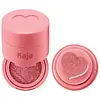What's inside
What's inside
 Key Ingredients
Key Ingredients

 Benefits
Benefits

 Concerns
Concerns

 Ingredients Side-by-side
Ingredients Side-by-side

Cetyl Ethylhexanoate
EmollientButylene Glycol
HumectantCaprylyl Methicone
Skin ConditioningPolybutene
Mica
Cosmetic ColorantSilica
AbrasiveMethyl Methacrylate Crosspolymer
Synthetic Fluorphlogopite
Polyglyceryl-4 Isostearate
EmulsifyingCyclopentasiloxane
EmollientPolypropylsilsesquioxane
Pentylene Glycol
Skin ConditioningCera Microcristallina
Emulsion StabilisingDextrin Palmitate
EmulsifyingStearalkonium Hectorite
Gel FormingCI 77891
Cosmetic ColorantCaprylyl Glycol
EmollientTriethoxycaprylylsilane
CI 77491
Cosmetic ColorantCI 77492
Cosmetic ColorantParfum
MaskingCI 77007
Cosmetic ColorantCI 77499
Cosmetic ColorantCI 73360
Cosmetic ColorantAluminum Hydroxide
EmollientCetyl Ethylhexanoate, Butylene Glycol, Caprylyl Methicone, Polybutene, Mica, Silica, Methyl Methacrylate Crosspolymer, Synthetic Fluorphlogopite, Polyglyceryl-4 Isostearate, Cyclopentasiloxane, Polypropylsilsesquioxane, Pentylene Glycol, Cera Microcristallina, Dextrin Palmitate, Stearalkonium Hectorite, CI 77891, Caprylyl Glycol, Triethoxycaprylylsilane, CI 77491, CI 77492, Parfum, CI 77007, CI 77499, CI 73360, Aluminum Hydroxide
Talc
AbrasiveMica
Cosmetic ColorantSilica
AbrasiveBoron Nitride
AbsorbentHexyl Laurate
EmollientDimethicone
EmollientCaprylic/Capric Triglyceride
MaskingDiphenylsiloxy Phenyl Trimethicone
Skin ConditioningMagnesium Myristate
Methylpropanediol
SolventCI 77220
Cosmetic ColorantDipentaerythrityl Hexahydroxystearate/Hexastearate/Hexarosinate
Skin ConditioningPropanediol
SolventTriethoxycaprylylsilane
Methicone
EmollientWater
Skin ConditioningCI 15985
Cosmetic ColorantCI 77491
Cosmetic ColorantCI 19140
Cosmetic ColorantCI 73360
Cosmetic ColorantCI 77007
Cosmetic ColorantCI 77499
Cosmetic ColorantTalc, Mica, Silica, Boron Nitride, Hexyl Laurate, Dimethicone, Caprylic/Capric Triglyceride, Diphenylsiloxy Phenyl Trimethicone, Magnesium Myristate, Methylpropanediol, CI 77220, Dipentaerythrityl Hexahydroxystearate/Hexastearate/Hexarosinate, Propanediol, Triethoxycaprylylsilane, Methicone, Water, CI 15985, CI 77491, CI 19140, CI 73360, CI 77007, CI 77499
 Reviews
Reviews

Ingredients Explained
These ingredients are found in both products.
Ingredients higher up in an ingredient list are typically present in a larger amount.
Ci 73360 is a synthetic red-pink dye.
This pigment is called Ultramarine blue lazurite. It gives a saturated blue color, but can be used to create other colors as well.
According to the manufacturer, it is usually made from kaolin, sodium sulfate, sodium carbonate, sulfur, and charcoal.
Ci 77491 is also hydrated iron III oxide. It's sole purpose is to give a red/pink hue to products.
Iron III oxides are classified as inorganic chemicals for coloring.
Synthetically created Ci 77491 is considered safer than those naturally found. This is because the synthetically created version may contain less impurities. Iron oxides are generally non-toxic and non-allergenic.
Learn more about CI 77491Ci 77499 is also hydrated iron III oxide. It is created from mixing red and black iron oxides. This helps give shades of darkness to a product.
Iron III oxides are classified as inorganic chemicals for coloring.
Mica is a naturally occurring mineral used to add shimmer and color in cosmetics. It can also help improve the texture of a product or give it an opaque, white/silver color.
Serecite is the name for very fine but ragged grains of mica.
This ingredient is often coated with metal oxides like titanium dioxide. Trace amounts of heavy metals may be found in mica, but these metals are not harmful in our personal products.
Mica has been used since prehistoric times throughout the world. Ancient Egyptian, Indian, Greek, Roman, Aztec, and Chinese civilizations have used mica.
Learn more about MicaSilica, also known as silicon dioxide, is a naturally occurring mineral. It is used as a fine, spherical, and porous powder in cosmetics.
Though it has exfoliant properties, the function of silica varies depending on the product.
The unique structure of silica enhances the spreadability and adds smoothness, making it a great texture enhancer.
It is also used as an active carrier, emulsifier, and mattifier due to its ability to absorb excess oil.
In some products, tiny microneedles called spicules are made from silica or hydrolyzed sponge. When you rub them in, they lightly polish away dead skin layers and enhance the penetration of active ingredients.
Learn more about SilicaTriethoxycaprylylsilane is a silicone used to bind and stabilize ingredients.
As an emulsifier, it helps prevent ingredients from separating. This can help elongate the shelf life of products.
Triethoxycaprylylsilane is often used to coat mineral sunscreens ingredients to help give a better feel. It also helps reduce oxidative stress in sunscreens.
Learn more about Triethoxycaprylylsilane